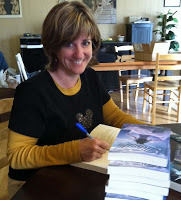
I try to attend a writer's conference every three to six months.Writing is a lonely venture. Just me and these imaginary people who talk to me sometimes. I spend most of each day seated behind my desk, typing on my computer. It's a life I love, but I need to get out every now and again, and conferences provide that opportunity.
While the food is usually mediocre and the strange hotel beds creak in ways that wake me early, the workshops and the networking opportunities provide me with a bit of
oomph. That is, I come away with a nugget or two that will help me in either my craft or the business side of being a writer. And sometimes I come away with a bit more--with a reminder of
why I write in the first place. (Hint: it's not for the book signings, lovely as they are.)
The SCBWI Oregon spring conference I attended this past weekend was one of those that gave me "a bit more" and will no doubt be helpful the next time I question why I do this crazy art-making called novel writing.
Two different editors said things that really struck me.
First, Melissa Manlove, editor at Chronicle Books (check 'em out
here) addressed her passion to create books that will resonate with young readers who have, perhaps, never experienced that magic which lies inside a book. She pointed out that
it only takes one book for a non-reader to become a reader and that everything changes for the child who makes this transition. "Once you become a reader, it will change your whole life," said Manlove. Um. Wow. Yes. I might have cried a little when she said this. It's why I write. Because reading changes your life.
Next, Andrew Karre, editorial director of Carolrhoda Books,
Carolrhoda Lab, and Darby Creek, issued a prescriptive for writers of young adult fiction. He insisted YA writers shouldn't write
for teens. Rather, we should think of ourselves as writing
about teens. Now, the difference is subtle, and may even seem to fly in the face of what I found so moving about Manlove's observation that books change lives.
As I thought through the apparent conflict between the two most moving things I heard at the conference, I began to see ways in which the two ideas co-exist. You see, a writer's job isn't to figure out
how to write that book that will change someone's life. Rather, the ability of a book to affect someone (even profoundly) is an outgrowth--a side effect, if you will--of writing. The calling of a writer is to make the best art he or she can. If, each time I sat down at the keyboard, I asked myself the question:
how can I change the life of a teenager through what I write, I would simply freeze. That is too weighty a calling, too large a task, and quite honestly, it's out of my control. But I can tell the kind of story I like and write it to the best of my ability; those tasks falls within the pale of "things I control."
And so, with the awareness that books
can change lives and the awareness that I write
about and not
for teens, I'm inspired to sit down today and not rise until I've put in my 2,000 words, telling the best story I can.
To satisfy my not-so-idle curiosity: Do you have a book that changed everything?

 newest »
newest »
 newest »
newest »
 I became a reader in first grade, at least that I remember, when I had to sit alone at the corner table during the reading part of class because my reading level was too advanced for the readers we had. So my classmates would read first-grade readers and I would sit by myself and read Junie B. Jones or a biography about Johnny Appleseed. So I guess Junie B. Jones started it all for me. (That and my dad's super-old copy of Black Beauty. I'm not sure, but it may have been an original printing.)
I became a reader in first grade, at least that I remember, when I had to sit alone at the corner table during the reading part of class because my reading level was too advanced for the readers we had. So my classmates would read first-grade readers and I would sit by myself and read Junie B. Jones or a biography about Johnny Appleseed. So I guess Junie B. Jones started it all for me. (That and my dad's super-old copy of Black Beauty. I'm not sure, but it may have been an original printing.)





